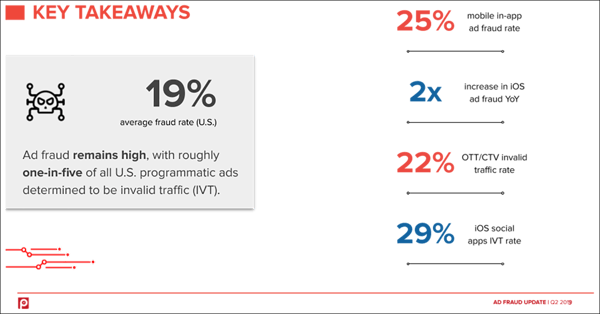
This week's review of ad fraud and quality in the digital advertising space.

Pixalate has released the Q2 2019 Ad Fraud Report, a comprehensive analysis of programmatic traffic quality and the state of invalid traffic (IVT) across desktop, mobile web, and mobile in-app advertising.

Join our expert panel at DMEXCO 2019 for in-depth analysis on the state of the mobile programmatic supply chain, featuring Pixalate, Criteo, MoPub, and Verizon Media.
Attend our panel on Wednesday, Sept. 11 at 2pm CEST in Hall 6.1, Booth E-058.
![]()
"Although digital advertising continues to snap up billions of ad dollars annually, brand-safety snafus, data-driven scandals and the constant threat of ad fraud are leading players in the programmatic space to be more choosy about where they spend their media money," wrote Adweek, reporting on a new PubMatic survey.
"The app market has certainly earned its risky reputation. A 2018 report from fraud-intelligence company Pixalate found app-based inventory had the highest concentration of invalid traffic," the article added.

"Google's Chrome team on Thursday proposed a 'privacy sandbox' that's designed to give us the best of both worlds: ads that publishers can target toward our interests but that don't infringe our privacy," reported CNET. One item in the proposal is a "trust token" meant to help combat ad fraud.
"[The proposal includes] a trust token that advertisers and publishers can use to reduce ad fraud by grouping web users into two segments -- trusted and untrusted," CNET added.
In this podcast, eMarketer asks: "Does brand safety mean avoiding the real world?"
"eMarketer principal analyst Nicole Perrin walks us through what could happen to the advertising world as blacklists become more sophisticated and extensive," the podcast description reads. "She discusses the types of content consumers think advertisers should avoid the most and the likelihood of those consumers reducing their spending on a brand that appears next to controversial content."
*By entering your email address and clicking Subscribe, you are agreeing to our Terms of Use and Privacy Policy.
These Stories on Weekly Recaps
*By entering your email address and clicking Subscribe, you are agreeing to our Terms of Use and Privacy Policy.

Disclaimer: The content of this page reflects Pixalate’s opinions with respect to the factors that Pixalate believes can be useful to the digital media industry. Any proprietary data shared is grounded in Pixalate’s proprietary technology and analytics, which Pixalate is continuously evaluating and updating. Any references to outside sources should not be construed as endorsements. Pixalate’s opinions are just that - opinion, not facts or guarantees.
Per the MRC, “'Fraud' is not intended to represent fraud as defined in various laws, statutes and ordinances or as conventionally used in U.S. Court or other legal proceedings, but rather a custom definition strictly for advertising measurement purposes. Also per the MRC, “‘Invalid Traffic’ is defined generally as traffic that does not meet certain ad serving quality or completeness criteria, or otherwise does not represent legitimate ad traffic that should be included in measurement counts. Among the reasons why ad traffic may be deemed invalid is it is a result of non-human traffic (spiders, bots, etc.), or activity designed to produce fraudulent traffic.”

